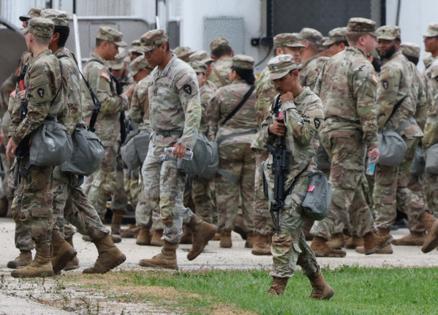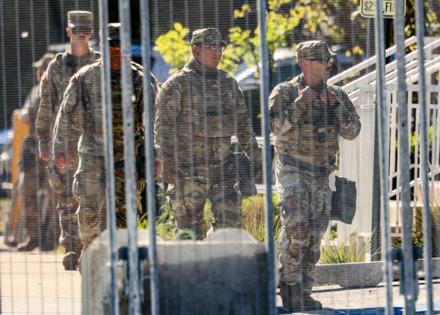Illinois and Trump brief US Supreme Court over administration's National Guard deployment powers
Published in News & Features
CHICAGO — Dueling legal interpretations of what constitutes “regular forces” are at the heart of briefings now positioned before the U.S. Supreme Court as the high court prepares to rule on President Donald Trump’s authority to deploy National Guard troops to Illinois.
While considering a motion to stay a lower court’s order blocking the deployment, the Supreme Court last month asked both sides — the Trump administration and the state of Illinois — to submit supplemental briefs dealing with a provision in federal law that Trump says allows him to dispatch National Guard troops in cases where there is an invasion, a rebellion or a time and when the president “is unable with the regular forces to execute the laws of the United States.”
The key issue the high court sought briefings on was whether the term “regular forces” means “the regular forces of the United States military,” and if so, how that fits into existing law involving the president’s power to order up the National Guard.
In his 15-page filing Monday, Trump’s U.S Solicitor General John Sauer doubled down on the administration’s argument that the term “regular forces” refers to civilian law enforcement — including immigration-enforcement agents such as Immigration and Customs Enforcement and Border Patrol officers and — and that the president was well within his authority to call up National Guard troops to assist them if they were unable to execute laws due to “present circumstances.”
“Given the nature of the problem in Illinois, it was a reasonable exercise of the President’s discretion to deploy National Guardsmen, who are civilians temporarily called to serve with deep experience in deescalating domestic disturbances among their fellow citizens,” the filing stated.
The standing military, whose primary function is to win wars against foreign enemies, was never intended for such a role, the filing noted.
But lawyers for Illinois Attorney General Kwame Raoul said in a filing late Monday that “regular forces” refers to the full-time, professional military, and that both history and the law make it clear the president “may federalize and deploy the National Guard only in rare circumstances where he is unable to execute federal law with the military.”
“These circumstances are not met here,” Raoul’s 15-page filing stated.
The court gave both sides until Nov. 17 to submit reply briefs.
The legal battle is one of several playing out across the country concerning Trump’s desire to deploy National Guard troops in Democrat-led cities that have long been a political target for the president.
In a similar case in Oregon, a federal judge last week ruled after a three-day trial that Trump “exceeded the President’s authority” when he sent federalized National Guard troops into Portland. That ruling will surely be appealed and is likely to land ultimately before the Supreme Court.
Trump in August initially suggested Guard troops were needed in Chicago to quell crime, despite evidence that crime was ticking down. His comments came in the weeks after he deployed troops to Washington, D.C., where he has more authority to do so. Trump’s explanation about needing troops in Chicago later changed to arguing the National Guard was needed here to protect ICE and Border Patrol officers engaged in deportation raids as part of its push dubbed “Operation Midway Blitz.”
Late Monday night, Trump re-upped his claims about Chicago needing troop intervention, despite signs that the immigration-enforcement operation appears to be winding down.
In a late-night post shared on Truth Social last night, Trump said the “Miracle Mile” — an apparent misnomer for Michigan Avenue’s “Magnificent Mile” — was “ready to call it quits” as building vacancies rise downtown due to violence and crime.
“CALL IN THE TROOPS, FAST, BEFORE IT IS TOO LATE! “Just the News,” President Trump wrote.
Illinois sued Trump in early October after he federalized some 700 National Guard troops in both Texas and Illinois for deployment to the Chicago area, ostensibly to protect immigration agents during “Operation Midway Blitz.”
U.S. District Judge April Perry issued a temporary restraining order Oct. 9 barring the deployment of National Guard troops in all of Illinois, and later extended it indefinitely pending a final ruling on the merits of the case.
The Trump administration then asked the Supreme Court to stay Perry’s order, calling it part of a “disturbing and recurring pattern” that “improperly impinges on the President’s authority and needlessly endangers federal personnel and property.”
In a 46-page response, the state said it would be inappropriate for the high court to get involved at this stage in the proceedings, where a district court’s decision has yet to be decided on appeal.
That filing also said lawyers for Trump offered “no meaningful response” to the factual basis for Perry’s Oct. 9 temporary restraining order, adding that declarations submitted by a series of immigration officials outlining purported violence against agents and out-of-control protests simply did not hold water.
“In fact, applicants do not even attempt to rebut that much of the activity the declarants complained about was constitutionally protected,” the state response stated.
In the first 10 months of his second term, Trump has been able to depend on the Supreme Court’s conservative majority to uphold his unprecedented broad use of executive power. Unlike in many of the administration’s other high-profile legal battles, however, the high court has moved cautiously on the Illinois dispute.
Martin Lederman, a Georgetown University law professor who specializes in presidential authority over the military, argued that Trump could not deploy the National Guard to Illinois because he had not shown it was impossible to do so with the “regular forces” at his command.
The 1908 law that Trump relied on to call out the guard set out a clear order for how the president is supposed to deploy military units in response to an invasion, rebellion or other circumstances that prevent the enforcement of federal law, Lederman explained: first would come the regular military forces, then the National Guard, then volunteer forces.
But that doesn’t mean Trump has the authority to call the military into Chicago, either, Lederman said. The president would still have to show that he had the right, under some other law passed by Congress, to deploy the so-called regular troops to the area.
“Congress designed the militia calling-forth authority to enable the President to use National Guard only in the same manner that he may make use of the regular military forces,” he wrote, “not as a backdoor that would invite the militarization of law-execution in cases where Congress has foreclosed the use of the standing Armed Forces themselves.”
____
©2025 Chicago Tribune. Visit at chicagotribune.com. Distributed by Tribune Content Agency, LLC.










Comments